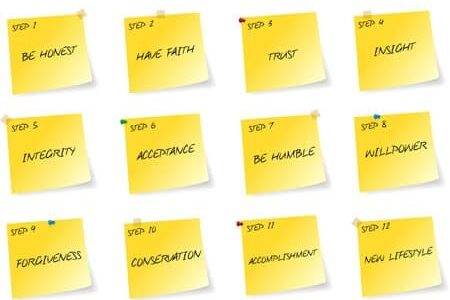The following are Step 6 to Step 12. At OASI, these steps are worked with a sponsor or their counselor once a person finishes the residential program. This does not mean that the following steps are of less importance than the first five, in fact, it is highly recommended that recovering addicts continue working on all the steps.
Step 6: Were entirely ready to have God remove all these defects of character.
- At this stage character defects, such as dishonesty, resentments, impulsivity, and pride are recognized.
- Once a person accepts these character defects, it does not mean that these defects will disappear as this is a process that requires time and effort.
Step 7: Humbly asked Him to remove our shortcomings.
- This is when one starts trying to change their character defects
- This requires a person to be open-minded, humble and faithful
- Communication with one’s Higher Power and Sponsor is also important
- This is also a process that takes time.
Step 8: Made a list of all persons we had harmed and became willing to make amends to them all.
- This is when a person starts to identify the pain, they had caused others during their active addiction
- Discussing these issues with a sponsor could be quite helpful and is recommended
- There could be an instance were trying to make amends would hurt the involved person even more and one realizes that it would be more considerate to not do so. For this reason, not all amends can be made.
Step 9: Made direct amends to such people wherever possible, except when to do so would injure them or others.
- This is the actualization of the previous step.
- If amends are made verbally, one needs to ensure that their actions reflect this and a change in behavior follows.
- Making amends must involve sincere efforts to apologize and adopting the right attitude before making an approach is essential.
- Talking through these amends with a sponsor could be helpful as they can discuss how it could be done.
Step 10: Continued to take personal inventory and when we were wrong promptly admitted it.
- This step continues to build on Steps 4 and 9.
- This step requires the person to keep a personal inventory of what they are going through.
- This is an important part of recovery as it allows the person to analyze the reasons behind decisions they make.
- This allows the person to strengthen and protect their recovery as well as keep a good relationship with themselves.
Step 11: Sought through prayer and meditation to improve our conscious contact with God, as we understood Him, praying only for knowledge of His will for us and the power to carry that out.
- This is Step 2 and 3 being practiced on a daily basis.
- This is spiritual rather than religious and the purpose of this Step is to connect with your Higher Power.
- The way in which a person prays or meditates is not important. What’s important is the effect these practices leave in a person’s life.
Step 12: Having had a spiritual awakening as the result of these Steps, we tried to carry this message to alcoholics, and to practice these principles in all our affairs.
- During this step, the focus shifts from ourselves to others.
- This involves sharing your experiences with others who might be going through similar situations.
- The last of the 12 Steps is to carry the message to others and to put the principles of the program into practice in every area of life.
- This has several benefits as it reminds recovering addicts of their early days in recovery and keeps them concerned about their own recovery.
While going through the 12 steps, it is important to remember that addiction recovery is a lifelong journey that requires work and dedication. One can never really say that they are finished with the program. Some might even decide to start the steps from the beginning again but this obviously depends on the person’s needs.


